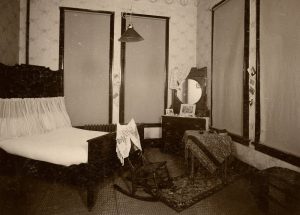
by Rachel DeShong, Special Event Coordinator and Map Curator
Today, we think nothing of flipping a switch and having instant light. But life was not always that simple. Prior to the spread of electricity, cities primarily used gas lamps for public lighting. Even Baylor used gas lights in its early years. The 1886 university catalog mentions gas lighting in the women’s boarding hall, although students were instructed to maintain candles on hand for their own rooms. So when did Baylor University first get electricity? Before we attempt to answer that question, it is important to learn when Waco first got electricity.
Wabash, Indiana is the first city in the world to be fully illuminated by electric lights when, on March 31, 1880, four 3,000-candle power lamps were lit above the town courthouse. Shortly thereafter, other cities began exploring the potential advantages of electric lighting. Despite the growing nationwide demand for electricity, on January 1, 1885, Waco decided to table the decision of converting to electric power. Writers from Waco newspaper The Day lamented, “Alas! For the prospects of electric lightening in Waco. They are dim.” However, officials experienced a quick change of heart, and on September 18, 1885, the city council voted 5 to 4 in favor of installing electric street lights, making Waco the second Texas city (after Corsicana) to get electric lights. Four days later, the contract with Jenney Electric Company from Indianapolis was approved. Work began, and on March 1, 1886, Waco officials turned on their electric street lamps for the first time. By 1892, there were three electric companies in Waco, proving that Wacoans were absolutely de-light-ed by the transition to electricity.Continue Reading
